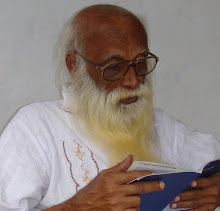GarudanKavu Temple, near Tirur, Malappuram district, is the only one in Kerala where
Garuda, (bird) vehicle of Vishnu, is installed ‘back to back’, in the same
sanctum sanctorum, and given equal prominence in worship. “Kavu” in the name
would indicate that it was the site of an earlier place of worship associated
with folk mores, before it was sanskritized.
The
legend attributes it to Perumthaccan, rather eccentric genius who was architect
and sculptor of most temples of this region. He carved an image of Garuda and
presented it to Vettattunad Raja, small principality that ruled this area
before it was annexed by Zamorin of Calicut. The Raja was mightily pleased, and
had it installed in the temple he was consecrating to Vishnu. Because of the
perfection of the icon of Garuda, astrologers prescribed it should be installed
in the same sanctum sanctorum. The statue of Garuda is about 60 cm tall from
its pedestal, and represents him standing with a pot of Amrta (nectar of
immortality he had grabbed from the gods) in his hands. His wings fall behind
his back – (usually Garuda is represented as if in flight, or just about to
take off). Cobras adorn him.
It is
believed that worshiping this deity will rid devotees of snakes. When
Parasurama legendarily inducted his colonizing Brahmins into Kerala, they were
scared of the snakes here. They fled; Parasurama brought them back. As precaution
against their fleeing again, he had their tufts of hair tied over their foreheads,
instead of behind the neck. They then deified snakes – perhaps in continuation
of pre-existing local tradition. The worship contained non-Brahmin rites such
as drawing colourful images of intertwining cobras, and propitiation with
offerings of milk and rice powder by Panar, later a dalit community.
At this temple,
the belief was different. Snakes would be captured alive, brought in bags or
cages to the temple, and released. They would be aggressive, until the priest
brought water sanctified by chanting Garuda mantra over it. He would sprinkle
it on the cobras; they would quieten down, sliding off into the undergrowth
surrounding the temple. They would not be seen again. It was believed that
Garuda ate them up, as they constituted his normal diet. I was informed that
there had been no case, in living memory, of any snake bite in the temple or
its vicinity. This practice was given up only as recently as a couple of years
back, when one cobra was especially ferocious and there was popular protest.
Nowadays, metal replicas of snakes suffice.
The
native approach to propitiation is by worshipping deities representing snakes
and contrasts with the method here, of offering them to their “natural enemy”,
Garuda. If you cannot befriend the enemy, then, the enemy’s enemy is your
friend!
An interesting footnote. When Perunthaccan brought the
image, the Raja exclaimed: “How life-like! Will it fly?” Perunthaccan replied
that it would, provided it was touched by a chaste woman. The story goes that
no woman was unwise enough to try!
[Note: Garuda and mother Vinita had been
enslaved by co-wife Kadru, the mother of serpent deities. The condition for
their enfranchisement: Garuda should bring Amrta from the custody of the gods under
Indra, for the snakes. Garuda set off – he easily beat off Indra and his
hordes. Vishnu took up the fray, but Garuda was not subdued. Vishnu said: “Well
done! Choose a boon!” Garuda, vain from victory, scornfully replied that as
Vishnu was the vanquished, he may ask for a boon instead. Vishnu said: “Please
be my vehicle”. Garuda had to keep his word; but only after he offered the pot
of nectar to the snakes, not all of whom succeeded in partaking of it, because
Garuda had to replace it within a stipulated interval].
T. Madhava
Menon/10 may 15
Garudan Kavu official website
Garudan Kavu official website

3 comments:
Enchanting... So did the ferocious snake get subdued?
Garuda's story, very well told with a good example of enemy's enemy is a friend!
Post a Comment